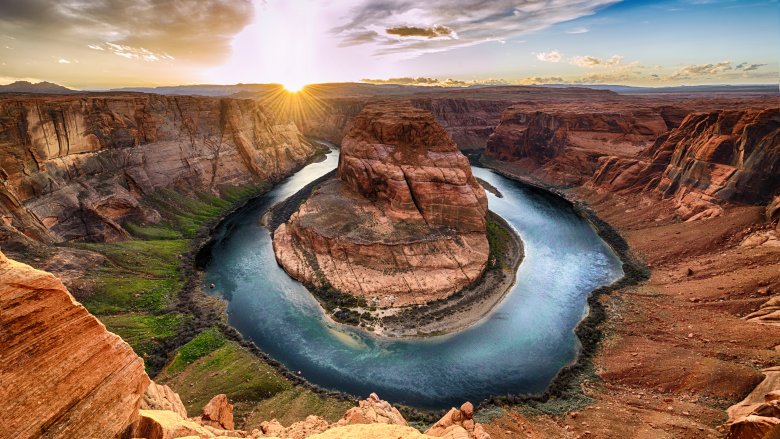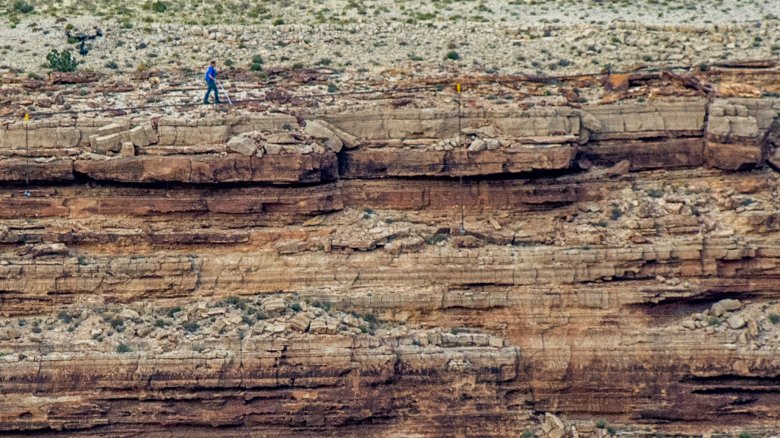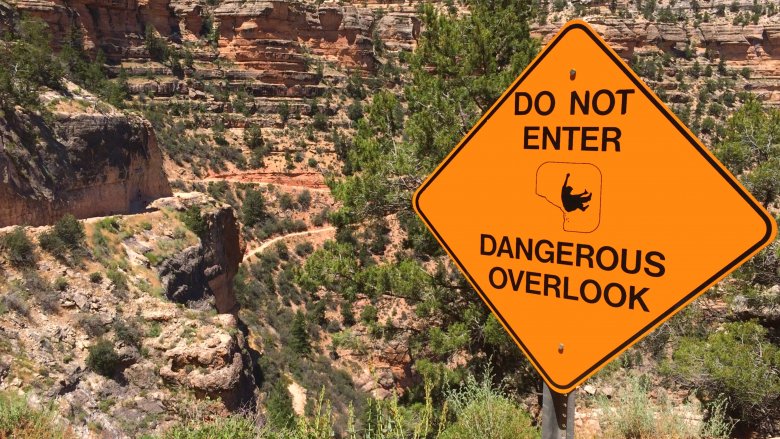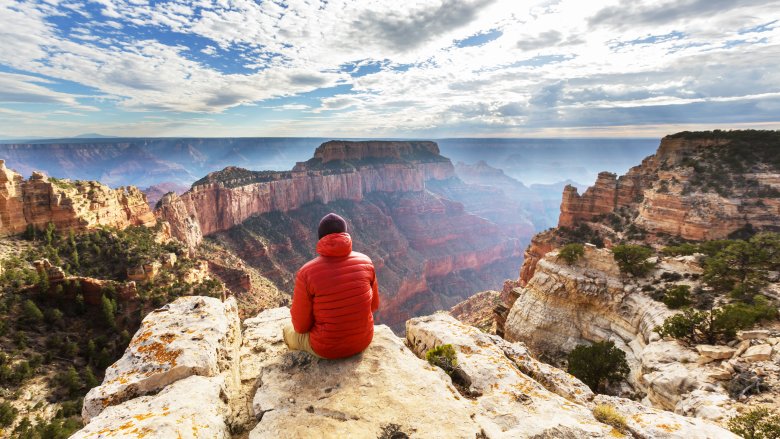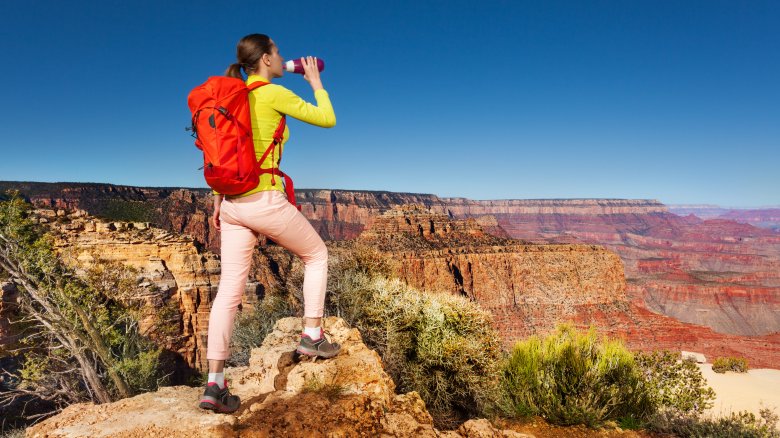Bizarre Things That Happened At The Grand Canyon
Of all the bizarre stories of things that have happened in the Grand Canyon, perhaps the most bizarre are the stories that don't actually end with someone dying. Nearly 700 people have died in the Grand Canyon, from suicides to dehydration to hypothermia, and the canyon continues to claim the lives of an average of 12 people every single year. Now no one would ever suggest that the Grand Canyon does these things on purpose, but we're totally suggesting that. The Grand Canyon is a very bad person. For your next vacation, go to Hawaii and camp at the base of a volcano instead. It's probably safer.
Some guy crossed the Grand Canyon on a tightrope
There's something about the Grand Canyon that inspires people to do stupid things. Once, a man fell 400 feet to his death while pretending to fall as a joke, which is probably one of the stupidest ways to die ever. Others have fallen while hopping from rock to rock or posing for selfies. And then there was this guy, seventh-generation tightrope walker Nik Wallenda, who crossed the Grand Canyon on a 2-inch-thick steel cable. And because safety harnesses are for chickens, he made the crossing with nothing but a pair of elk-skin shoes, one of those super-long poles, and a whole lot of "help me Jesuses."
Don't worry, though, officials were totally prepared. According to CBS News, a paramedic was standing by below in case of a fall. Because after plummeting 1,500 feet, a paramedic can easily fix you up with a few band-aids and some Neosporin.
The most remarkable part of this story is not the walk itself or the fact that Wallenda had to crouch down a couple of times to avoid being blown off the wire by 30 mph winds, but the fact that the grim reaper didn't give his arrogant butt a little push. The grim reaper does rather like to kill people in the Grand Canyon.
Newlyweds vanish on a rafting trip
Most newlyweds go to Paris, or maybe Fresno. Not Glen and Bessie Hyde — they were going to the Grand Canyon, and not just to stand on the edge of it and gawk. They were going to set a record. According to NPR, Bessie wanted to be the first woman to raft all the way through the canyon.
Then they died. Well, actually no one really knows if they died because they just never came back from their honeymoon. Their boat was found floating in a still pool loaded with food, clothes, a guidebook, and a gun. It had traveled 600 miles and was just 46 miles from its destination, but there was no sign of the Hydes.
The story of the missing honeymooners inspired two books and a whole bunch of campfire tales, each of which has a different end-theory. But the problem with theories is that they're like toilets — everyone has at least one, and they're usually full of poop. Since their 1928 disappearance, speculation has ranged from murder to drowning — the latter of which seems like the most reasonable explanation. At least one sleuth tried to recreate the couple's journey with a replica of their sweep scow, which turned out to be extremely difficult to control. According to Grand Canyon History, it seems likely that the couple hit some particularly furious rapids and got tossed overboard. Boring, yes, but you know what they say: The boringest explanation is usually the truth. They do say that, right?
A man fell 150 feet and survived
People falling into the Grand Canyon is really just another day at the office for this beloved, person-eating sociopath of a national park. In fact, scientists have learned that the Grand Canyon needs to consume at least 12 souls a year or Gwyneth Paltrow will start aging.
We mostly never hear headlines that say "Person falls into Grand Canyon and dies" because that's sort of like running a story with the headline "Person breathes air." What is worthy of a front-page headline is this: "Person falls into Grand Canyon and survives."
According to the Grand Canyon-area Williams News, in 2000 a man from Odessa, Texas, tried to kill himself by jumping into the Grand Canyon. Now if you're going to take your own life, jumping into the Grand Canyon is a pretty epic way to go, and you have that amazing view to admire on your way down. This guy fell about 30 feet, then some trees broke his fall, and he went down another 120 feet. Rescuers said he broke a bone in every limb but miraculously escaped head injuries. And to make this story even more bizarre, less than two weeks later another dude did exactly the same thing, in exactly the same spot, and also survived. So clearly, if you're going to attempt suicide in the Grand Canyon but you're not completely sure that you really want to die, well, that's the spot to do it.
A serial killer used the Grand Canyon as a murder weapon
At some point it occurred to serial killer Robert Spangler that he'd been killing people like a sucker, with a gun, and it would just be so much easier to avoid suspicion if he pushed them into the Grand Canyon instead.
According to the LA Times, after getting away with the murder of his first wife and their two children, Spangler married and divorced a second woman, and then married his third wife, an aerobics instructor named Donna Sundling. The couple were together just three years when Spangler said, "Hey, honey, how about a romantic trip to the Grand Canyon?" And Donna said, "Sounds lovely," and then she plummeted 200 feet to her death. Spangler later told police that he'd been messing with his camera and when he looked up, his wife was gone.
Donna's family was shocked to learn of the "accident" because Donna was athletic and also afraid of heights, but really, what could the police do? The Grand Canyon is pretty much a serial killer on its own, and without any witnesses you can't prove that a fall wasn't accidental. It wasn't until 2000, when Spangler got a late-stage cancer diagnosis that detectives showed up at his house to ask if he had anything he wanted to tell them. Since Spangler had only six months to live, he figured he had nothing to lose, and confessed to all four crimes. His cancer did eventually kill him, but not before he briefly got to see the inside of a federal prison.
Mom hikes 14 miles in a snowstorm to save family, then family saves her
GPS is a scourge on humanity, and also it sucks. Proof: The family vacation of Karen, Eric, and Isaac Klein. According to The Morning Call, the family was driving along the North Rim of the Grand Canyon in the snow when their GPS helpfully informed them that the highway was closed. But don't worry, said the GPS, you can take this Forest Service road instead. And then the GPS laughed evilly, but the Kleins were maybe listening to Christmas music or something and didn't notice. The road turned to a sucky, muddy, gravel death trap, and when they tried to turn around, the car ended up in a ditch.
Naturally, they were stuck in a land with no cell service, and also presumably with no Starbucks because that's what happens when you go places with no cell service. Karen decided to hike out and find help. Then she ran out of food and had to eat sticks. And drink her pee. Because even though snow is just frozen water, eating it can put you at risk for hypothermia.
Meanwhile, Eric and 10-year-old Isaac hiked to higher ground and got a cell signal and a couple of lattes. (Not really the lattes, but the point is it was pretty easy compared to what Karen was going through.) By the time rescuers located her, she was sheltering in an abandoned cabin. She had frostbite, but miraculously, didn't lose any toes. The moral of this story? Your GPS is evil and wants to kill you. The end.
A woman died from water intoxication
If you're going to go hiking in Arizona in the summertime, the advice you'll probably hear the most is "stay hydrated." What no one tells you, though (mostly because no one knows), is that it is possible to become too hydrated.
That's what happened to a 47-year-old woman after a 6-mile hike in the Grand Canyon. According to Medical Daily, while on the hike the woman "ate very little" but drank a large quantity of water, which put her at high risk for exercise-associated hyponatremia (EAH), a condition characterized by extremely low levels of blood sodium. She died less than a day after the onset of symptoms.
Until recently, EAH was something seen mostly in marathon runners and other endurance athletes, but this particular incident proved the theory that hikers could be at risk as well. As terrifying as this story is, no one is going to stop telling you that you ought to stay hydrated on long hikes in the sun, but you should probably also consider packing a granola bar. Or two.
Total cloud inversion
Despite the fact that it's evil and kills people for fun, the Grand Canyon is still one of the most beautiful places in the world. If you visit at the right time of year, are exceedingly lucky, and are also not dead on the banks of the Colorado River, you might actually get to see a rare phenomena called a total cloud inversion.
According to LiveScience, total cloud inversions happen when a layer of warm air just above the surface of the ground stops the cooler air and moisture just below from dispersing, much like the icy grip of death stops hapless Grand Canyon hikers and other tourists from living out the rest of their lives surrounded by friends and family. It's mostly a winter phenomena, so if you're hoping for a chance to witness a total cloud inversion, you'll need to visit during the colder months.
During a total cloud inversion, a thick cloud layer can form, and from above it looks like ocean waves in cloud form. Sometimes the cloud layer can be so dense that it completely obscures the depth of the canyon — though happily, so far no one (that we know of) has been lulled into stepping over the edge because it doesn't really look like much of a fall. You're not fooling anyone, Grand Canyon.
Brighty got eaten
The 1953 novel Brighty of the Grand Canyon brought fame to a burro that lived on the banks of Bright Angel Creek. Named "Brighty," the burro spent most of his years wandering the canyon and occasionally spending time with tourists and with the family that managed the North Rim tourist facility. According to Grand Canyon History, Brighty was famous for eating pancakes and evading capture, although he did occasionally help out construction crews and let kids ride him.
The novel told the story of Brighty's life charmingly but left out the horrifying details of his death — during a particularly hard winter in 1921, a thief who was trying to get away with $6,000 in Liberty Bonds managed to catch the otherwise uncatchable Brighty to use as a pack animal. Brighty and the thief made their way to an abandoned cabin, but along the way the thief lost his pack and found himself with very little food. Not long after that a former Marine showed up at the cabin. Desperate, the two men decided there was only one thing they could do to ensure their own survival — eat Brighty. Fortunately for every child in America, author Marguerite Henry decided not to include that little morsel in her novel.
Incidentally, the Marine survived and the thief wandered off into a snowstorm and was never seen again. Maybe he froze to death, and something ate him. Maybe. Karma doesn't really seem to be a thing in the Grand Canyon.
A man bought a cursed blanket
Many Grand Canyon stories are just legends — fantastic tales that have been so embellished over the years that no one can really say how much is fiction and how much is fantasy. Such is the case of the cursed Navajo blanket, said to be so beautiful that "No one could see it and not desire it."
According to NPR station KNAU, the blanket was obtained by a trader named Don Maguire who never got the memo about the Grand Canyon's decades-old killing spree and didn't believe the tales of woe from the woman who gave it to him. Since the Grand Canyon loves to stick it to non-believers, Maguire spent the next two years enduring "a hundred calamities" until he was fortunate enough to finally misplace the stupid thing.
Maguire later learned that the blanket had been made by a weaver who was known for putting spells into her work, and this one had been meant to curse some guy who pissed her off. Sadly the curse outlived the man, who died mysteriously, leaving behind nothing but the bloodstained blanket. Evidently they had an early version of Oxy-Clean in those days because whoever found the blanket was able to get the blood out of it and pass it on to some other unfortunate victim, and so on, until it ended up in the hands of Don Maguire. No one's sure exactly what became of it after that. Maybe someone turned it into a saddle pad for poor Brighty.
The Sipapu
And finally, a word of caution for anyone planning to hike the Grand Canyon — stay away from the Sipapu. Backpacker magazine called that part of the canyon one of "America's scariest trails," not just because it's said to be the doorway to the underworld but also because of the ghosts.
This particular part of the canyon is also called "Crash Canyon," named for the midair collision that happened just above it in 1956. At least one person has a story of seeing the ghosts of people who died in the collision — K.J. Glover told the author of Haunted Hikes that one night she heard voices outside her tent and looked out to see "more than a dozen" people walking up the trail, wearing clothes that no one ever wears while hiking in the Grand Canyon.
As for the Sipapu, that's a big, reddish lump with a hole in it that the Hopi believe is the "Place of Emergence," or the gateway between the underworld and this world. People are so superstitious about the Sipapu that the Hopi warn everyone who enters the area to avert their eyes. Even helicopter pilots refuse to look down when flying over it, and park rangers supposedly shudder when asked about it. (Whether from fear or annoyance is unclear.) Stories of ghosts, people getting struck by lightning, strange voices in the dark, and deadly falls are all associated with camping or hiking in the area. Though you can probably safely exclude "deadly falls" as being particular to the Sipapu.
